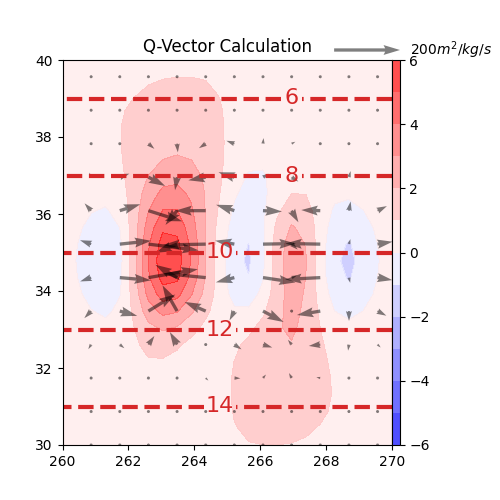Note
Go to the end to download the full example code.
Q-Vector#
Use metpy.calc.q_vector.
This example demonstrates the q_vector calculation by computing them from the example xarray Dataset and plotting using Matplotlib.

/home/runner/work/MetPy/MetPy/examples/calculations/QVector.py:25: UserWarning: Vertical dimension number not found. Defaulting to (..., Z, Y, X) order.
tadv = mpcalc.advection(ds.temperature, ds.uwind, ds.vwind)
import matplotlib.pyplot as plt
import numpy as np
import metpy.calc as mpcalc
from metpy.cbook import example_data
from metpy.units import units
# load example data
ds = example_data()
# Calculate the temperature advection of the flow
tadv = mpcalc.advection(ds.temperature, ds.uwind, ds.vwind)
# Calculate the q-vectors. Passing in a fixed value of static stability, but could also
# use `mpcalc.static_stability()`.
u_qvect, v_qvect = mpcalc.q_vector(ds.uwind, ds.vwind, ds.temperature, 850 * units.hPa,
static_stability=2e-6 * units('J / kg / Pa^2'))
# start figure and set axis
fig, ax = plt.subplots(figsize=(5, 5))
# plot isotherms
cs = ax.contour(ds.lon, ds.lat, ds.temperature, range(4, 26, 2), colors='tab:red',
linestyles='dashed', linewidths=3)
plt.clabel(cs, fmt='%d', fontsize=16)
# plot temperature advection in Kelvin per 3 hours
cf = ax.contourf(ds.lon, ds.lat, tadv.metpy.convert_units('kelvin/hour') * 3, range(-6, 7, 1),
cmap=plt.cm.bwr, alpha=0.75)
plt.colorbar(cf, pad=0, aspect=50)
# calculate a scale length quantity of our vectors based on their mean
scale = (np.hypot(u_qvect, v_qvect).mean() * np.sqrt(u_qvect.size)).data
# plot Q-vectors as arrows, every other arrow
qvec = ax.quiver(ds.lon.values[::2], ds.lat.values[::2],
u_qvect[::2, ::2], v_qvect[::2, ::2],
color='black', scale=scale.m, alpha=0.5, width=0.01)
# calculate representative arrow for key
key = scale / 10
# add key for arrow length
qk = ax.quiverkey(qvec, 0.65, 0.905, key.m, f'{key:0.2~P}', labelpos='E',
coordinates='figure')
ax.set(xlim=(260, 270), ylim=(30, 40))
ax.set_title('Q-Vector Calculation', loc='left')
plt.show()
Total running time of the script: (0 minutes 0.147 seconds)
